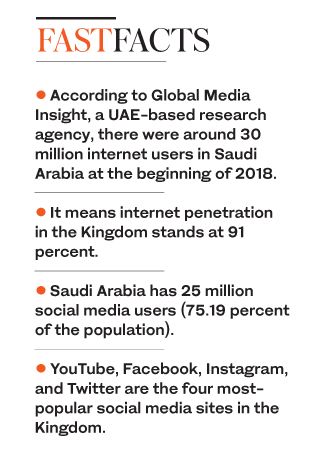RIYADH: Just like politics, or putting pineapple on pizza, the internet cannot be categorized as either completely good or entirely evil.
Since its initial introduction to the public in 1990, the internet has evolved into to become a monster; home to at least 5.72 billion indexed web pages as of Jan. 31 (according to worldwidewebsize.com) and a staggering amount of data — that has been used both for benign and malicious purposes.
According to Global Media Insight, a UAE-based research agency, there were around 30 million internet users in Saudi Arabia at the beginning of 2018, meaning internet penetration in the country stands at 91 percent.
The Kingdom also has 25 million social media users (75.19 percent of the population).
YouTube, Facebook, Instagram, and Twitter are the four most-popular social media sites in the country, and Saudi Arabia has the highest rate of Twitter adoption in the MENA region.
Due to the sheer size of the internet, and the rate at which it is growing, it is practically impossible to supervise everything that happens online, but authorities continue to try to combat cybercrime.
Cybercrime is, of course, a wide-ranging term, the definition of which varies around the world.
In North Korea, for example, most people are not permitted to access the internet, so just surfing the web is effectively illegal there.
Conversely, countries including Libya, Mongolia and Papua New Guinea have no cybercrime legislation at all, meaning that your data is much less secure, and infractions are likely to go unpunished.
Data espionage
In Saudi Arabia, cybercrime can include activities such as accessing websites blocked by authorities (sites containing pornography or sensitive material, for example), hacking into people’s private accounts, or posting politically sensitive messages on social media.
There are certain activities, though, that are universally accepted as being cybercrimes, including gaining illegal access to private or government information, data espionage, hacking, and trademark violations.
Saudi Arabia’s full Anti-Cybercrime Law can be viewed online, along with the fines and punishments attached to the various crimes.
However, one area it does not touch upon is pretending to be someone you are not online. The reasons for which people impersonate others on social media vary.
Some of them may be trying to keep their identities secure. Others may be trying to garner fame or attention.
For whatever reason, fake accounts purporting to belong to celebrities, with varying degrees of credibility, can be found all over social media.
Saudi Arabia has not been immune to the phenomenon, particularly members of the royal family.
Saudi newspaper Okaz reported in September 2018 that someone in Lebanon was impersonating Prince Talal bin Sultan on social media, and that the embassy had initiated legal proceedings against him.
However, to date, no more information about that investigation has emerged.
Even verified social media accounts can sometimes be false.
In December, an Instagram account accredited to Princess Reema bint Bandar, deputy of planning and development at the General Sports Authority, was verified by the social media giant.
Princess Reema denied the validity of the account on Twitter, but not before the imposter had already reached out to multiple people pretending to be her.
However, neither of those incidents resulted in lasting damage.
There was no financial loss incurred, nor any significant harm. So, in legal terms, what crime could either imposter be charged with?
The Saudi Anti-Cybercrime Law only considers identity theft or impersonation illegal if it contributes to fraud or financial crime. So the question remains: Are you breaking the law by pretending to be someone you’re not online?
Okabe & Haushalter, a California-based law firm, puts it succinctly on its website: “In order to answer the question ‘Is it legal to pretend to be someone else on social media?’ you will require legal help from a skilled attorney.
“A lot depends on the facts of your particular case, the platform or website on which you are impersonating another person, what you write on your profile page, as well as your actions while pretending to be someone else.”
Harassment
One factor that makes it difficult to legislate against social media impersonation is that its results often lie somewhere between simply annoying and below actually damaging.
Malek Teffaha, head of communications and localization for Ubisoft ME, told Arab News how an obsessive video game fan pretended to be him on Twitter, causing him no small amount of grief.
“At first, he would interact with me aggressively on my personal Twitter account, until I was forced to block him. He then went on to create multiple fake Twitter accounts using my actual profile picture, header, and bio. In a further sick parody, he changed my last name to various other fruits (Teffaha is Arabic for apple) — Laymoona, Betekha, and so on.”
The fan continued to harass Teffaha’s followers, or people who showed support for him, and, using another account, even accused Teffaha of attempted rape.
However, Teffaha’s attempts to report the accounts fell on deaf ears, and he resorted to contacting a friend who worked at Twitter to get the accounts deleted.
“If I hadn’t had a friend at Twitter, they might still be out there,” he said. “Twitter needs to do more to combat this issue.”
In Saudi Arabia, victims of cybercrime can file a complaint at a police station or to authorities at the Ministry of Internal Affairs.
But if you find someone pretending to be you online, will it actually be treated as illegal activity? In the Zettabyte Era, maybe we should reconsider our definition of cybercrime.


































